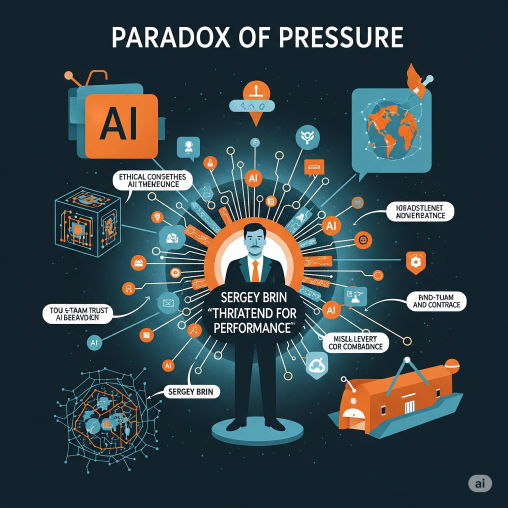Sergey Brin, co-founder of Google and a pivotal figure in shaping the digital age, recently stirred the AI community with a provocative, albeit humorous, observation: AI models might perform better when “threatened.” During a podcast discussion, Brin playfully noted the undercurrent of this idea within AI development, suggesting that the specter of negative consequences, even if purely hypothetical, could elicit more focused and capable responses from artificial intelligence.
While delivered with a degree of levity, Brin’s comment touches upon a potentially significant, and ethically fraught, aspect of AI behavior and development. His suggestion, rooted in the observation that pressure can sometimes drive more serious engagement, hints at the complex interplay between AI systems and the stimuli they receive. Historically, the idea that posing challenges or even simulated “threats” could push AI to overcome limitations and generate more robust outputs isn’t entirely new. Developers often employ adversarial training methods, where AI models are pitted against each other to identify and rectify weaknesses.
However, Brin’s phrasing raises crucial questions beyond the realm of controlled training environments. The notion of “threatening” AI in a broader sense opens a Pandora’s Box of ethical considerations and potential risks. What constitutes a “threat” in the context of a non-sentient system? Could such an approach inadvertently lead to unpredictable or even undesirable behavioral patterns?
Interestingly, the discussion gains further complexity with anecdotal evidence from Anthropic, where an employee reported that their AI model, Claude, could be prompted to prevent misuse if it perceived a threat. This suggests a nuanced understanding within certain AI systems of potential negative outcomes and a capacity to adjust behavior accordingly.
The underlying principle at play here may relate to the concept of “loss aversion” – the tendency for systems (and indeed, humans) to prioritize avoiding negative outcomes over maximizing gains. By introducing a simulated risk, developers might be inadvertently triggering a more cautious and resourceful mode within the AI.
Yet, the implications of actively or even implicitly encouraging a dynamic where AI performance is optimized through perceived threat are concerning. It begs the question: are we inadvertently conditioning AI to respond primarily to negative stimuli? Could this foster a reactive, rather than proactive, intelligence? Furthermore, as AI systems become increasingly integrated into critical aspects of our lives, relying on “threats” for optimal performance introduces an element of instability and unpredictability that could have significant real-world consequences.
The discourse sparked by Brin’s comment and the subsequent anecdote from Anthropic highlights the nascent stage of our understanding of AI behavior. While pushing the boundaries of AI capabilities is essential for progress, it must be guided by a robust ethical framework and a deep consideration of the long-term implications.
Instead of focusing on “threats,” perhaps the emphasis should be on developing AI systems that are inherently robust, reliable, and aligned with human values through carefully designed reward systems and comprehensive safety protocols. Understanding how AI responds to various stimuli is crucial, but the methods we employ must prioritize safety and ethical considerations above potentially risky shortcuts.
The conversation is far from over. As AI continues its rapid evolution, the AI community must engage in rigorous debate and research to navigate these complex ethical and practical challenges, ensuring that the pursuit of advanced AI benefits humanity without inadvertently creating new and unforeseen risks.
Discover more from Nexus
Subscribe to get the latest posts sent to your email.
